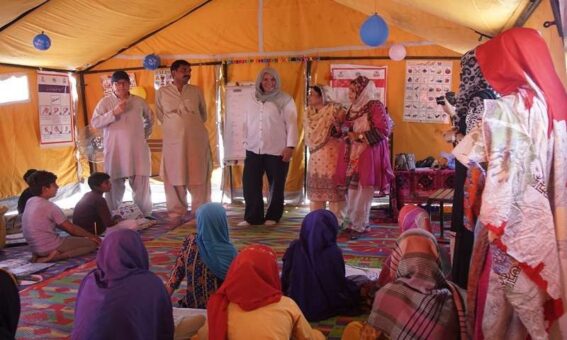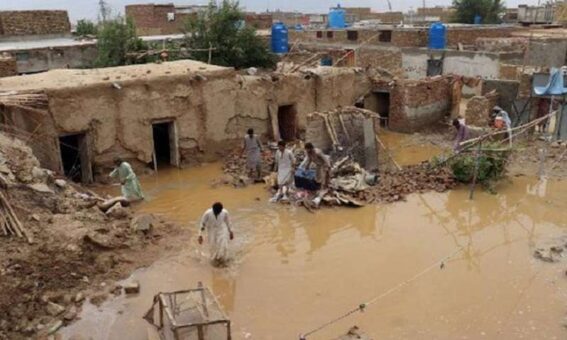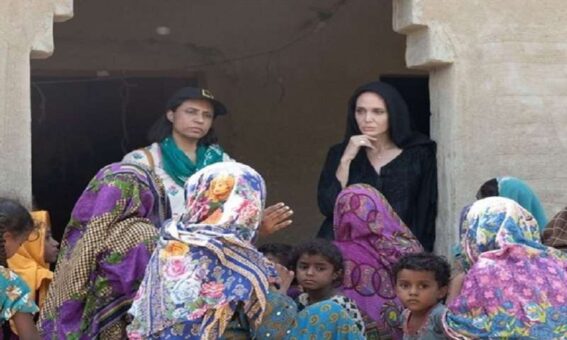In a move aimed at facilitating and expediting flood relief efforts, the Federal Board of Revenue (FBR) announced on Wednesday that it would be waiving customs duty, excise duty, and taxes on consignments related to flood relief activities for the next three months.
(more…)Tag: Pakistan Floods
-

Sindh exempts sales tax on services provides for floods relief by customs agents, port operators
The Sindh government has taken a significant step in supporting flood relief operations by exempting sales tax on services provided by customs agents and terminal operators.
(more…) -

Pakistan flood rehabilitation poses challenge to fiscal consolidation
ISLAMABAD: Catastrophic flood in Pakistan has required rehabilitation and massive expenditures which will pose significant challenge for fiscal consolidation, the ministry of finance said on Sunday.
In the monthly Economic Update and Outlook October 2022 released by the ministry of finance said that on the other hand, growth prospects have weakened, along with contained economic activities and low demand will impact on resource mobilization. Thus, current fiscal year is moving with challenges, seeking balance policy mix for stabilization.
READ MORE: ECC approves grant for salary disbursement to PSM employees
In the long run, sound fundamentals and a healthy growing economy, a significant raise is required in gross fixed capital formation instead on consumption. This will increase the National Income significantly. Further, there is need to enhance the productive capacity and productivity in each sector to substitute imports by domestic production and provide more supply capacity to the foreign markets, the report added.
The trade balance of Pakistan is expected to improve in the coming months on account of import contraction due to a deceleration in domestic economic activities and aggregate demand.
READ MORE: Headline inflation likely to increase 22.7% in October 2022
“Overall economic outlook shows an optimistic picture of the economic performance in the coming months. The Consumer Price Index (CPI) inflation is declining, rupee has gained stability, current account balance is on improving trend. These development indicate that economic activity will remain positive and persistent in coming months”, the report added.
It said for the future path of inflation, the exchange rate is of utmost importance. Moderating inflation also contributes to exchange rate stability, which in the benign case may generate a virtuous inflation-exchange rate cycle. Further, the exchange rate stability requires sound economic fundamentals.
Besides inflation, also a manageable current account deficit and guaranteed financing of this deficit by healthy financial inflows are required. When markets get convinced about these prospects, speculative bubbles in the exchange market would be highly unlikely.
In the baseline short to medium run, helped by sound domestic fiscal and monetary policies, the current account deficit is expected to reduce. A major risk factor, though, relates to the necessary imports to absorb the devastating consequences of the floods. However, downward revision of Pakistan’s main trading partners’ outlook may have a downside risk for exports in coming months.
READ MORE: SBP’s weekly forex reserves dip by $157 million to $7.44 billion
The report added that the provisional net tax collection in September FY2023 stood at Rs 684.8 billion against Rs 534.0 billion in the same month of last year, posting a growth of 28.2 per cent. Thus, the first quarter of the current fiscal year ended up with a growth of 17 per cent with a net tax collection of Rs 1633.9 billion against Rs 1396.4 billion in the comparable period of last year.
Similarly, the target for the first quarter has also been surpassed by Rs. 24.4 billion.
The fiscal deficit during July-August FY2023 has been recorded at 0.9 per cent of GDP (Rs.672 billion) against the deficit of 0.7 per cent of GDP (Rs.462 billion) in the same period of last year. While the primary balance posted a deficit of Rs.90 billion (-0.1 per cent of GDP) in July-August FY2023 against the deficit of Rs 37 billion (-0.1 per cent of GDP) in the comparable period of last year.
The Current Account posted a deficit of $ 2.2 billion for July-September of current fiscal year as against a deficit of $ 3.5 billion last year, mainly due to increase in exports and contraction in imports.
Pakistan’s total liquid foreign exchange reserves increased to $ 14.6 billion on October 26, 2022, with the SBP’s reserves now stood at $ 8.9 billion. Commercial banks’ reserves remained at $ 5.7 billion.
READ MORE: SBP receives $1.5 billion from Asian Development Bank
According to FCA, the production of Sugarcane decreased by 7.9 percent to 81.6 million tonnes from 88.7 million tonnes of last year’s production, the report said adding that rice production declined by 40.6 percent to 5.5 million tonnes over last year’s production of 9.3 million tonnes.
Maize production decreased by 3.0 percent to 9.2 million tonnes compared to 9.5 million tonnes last year. The cotton production declined by 24.6 percent to 6.3 million bales from 8.3 million bales last year. The wheat production target for upcoming Rabi 2022-23 is fixed to the tune of 28.370 million tonnes from an area of 9.3 million acres.
With respect to inflation, the report said it can be expected that YoY CPI inflation in the month of October will maintain its declining tendency observed in September. It is expected that CPI inflation will remain in the range of 21-22.5 per cent.
-

Asian Bank approves $1.5 billion to finance Pakistan
Asian Development Bank (ADB) has approved $1.5 billion in financing to help Pakistan provide social protection, promote food security, and support employment for its people amid devastating floods and global supply chain disruptions.
In a statement issued on Friday, the ADB said the loan, provided under ADB’s Building Resilience with Active Countercyclical Expenditures (BRACE) Program, will help fund the government’s $2.3 billion countercyclical development expenditure program designed to cushion the impacts of external shocks, including the Russian invasion of Ukraine.
“Pakistan’s recovery from the COVID-19 pandemic has been impeded by external shocks,” said ADB Director General for Central and West Asia Yevgeniy Zhukov.
“Increasing business costs and rising living expenses are affecting millions of Pakistanis, especially the poor and vulnerable. ADB’s program will help the government manage the impacts of high prices, increasing food insecurity, slowing business activity, and reducing income for vulnerable groups, many of whom are also reeling from the devastating floods.”
ADB’s financing will provide the fiscal space needed for the government to implement its countercyclical development expenditure package, which is designed to target the poorest families in Pakistan who are often disproportionately affected in times of crisis.
The government’s support includes specific measures to promote gender empowerment and climate change adaptation, which have become even more important in light of the recent floods.
ADB’s assistance will help to expand the number of families receiving cash transfers from 7.9 million to 9 million, increase the number of children enrolled in primary and secondary schools, and enhance geographic coverage of health services and nutritional supplies for pregnant and lactating mothers and children under 2 years old.
“The program is part of a comprehensive and well-coordinated package of support. It will help the government deal with the impact of the immediate shocks to the economy, while, in parallel, continue the structural reforms that are necessary to improve the country’s medium- to long-term macroeconomic prospects,” said ADB Director for Public Management, Financial Sector, and Trade Tariq Niazi.
“We are working closely with the International Monetary Fund and other development partners to ensure that our support through policy dialogue, technical assistance, and program lending is well-coordinated and that, ultimately, we are able to help the government improve Pakistan’s resilience to shocks.”
ADB’s $1.5 billion countercyclical support is part of a significant response package to support people, livelihoods, and infrastructure in Pakistan in the wake of the recent floods which have affected over 33 million people and caused extensive damage to infrastructure and agriculture.
Pakistan was a founding member of ADB. Since 1966, ADB has committed over $37 billion in loans, grants, and other forms of financing to promote inclusive economic growth in Pakistan and improve the country’s infrastructure, energy and food security, transport networks, and social services.
-

Save The Children commits $50 million for flood response
KARACHI: Save The Children has committed to provide $50 million for rehabilitation of schools in flood hit areas in Sindh.
Save the Children and provincial government planned to set up 600 Temporary Learning Centers (TLCs) because of damaged schools infrastructure across Sindh.
The TLCs are provided in four districts of Dadu, Sanghar, Shikarpur and Khairpur with an aim to resume students’ educational activities stalled following the devastating floods. In order to ensure the smooth and effective relief and rehabilitation process, Save the Children has committed USD 50 million for the floods response 2022.
In this regard, Save The Children has signed a Letter of Understanding with Sindh Government’s Sindh Education Foundation (SEF) and Legal Rights Forum (LRF) to establish 600 Temporary Learning Centers (TLCs) besides scaling up the response and support for flood affected children on immediate basis.
To witness the development and ensure continuous support, Country Director Save the Children, M. Khurram Gondal, Global Humanitarian Director Save the Children, Gabriella Waaijman and Director Advocacy, Policy and Government Liaison, Usman Aslam visited temporary learning centers and children friendly spaces being managed in Dadu and also provided Food/ Non-Food Items, dignity kits and other necessary relief items to the flood affected communities in district Dadu.
“We are ensuring resumption of students’ education despite the damage caused to the schools due to the recent flood,” Khurram Gondal said on the occasion.
Gabriella Waaijman expressed deep sorrow and offered her condolences over the losses and expressed solidarity with Pakistani government. She said that Save the Children is putting in all resources and efforts so that students’ education activities are resumed to recover education loss as much as we can.
The Sindh government has already declared Save the Children as its strategic partner for the Pakistan Flood Response 2022, following the permission by federal interior ministry to carry out humanitarian activities in all floods-affected districts of Pakistan, in coordination with NFRCC, NDMA, and respective PDMAs.
Main objective of this partnership is to strengthen public private partnership for Education in Emergency in Sindh. All the three signatories will initially work together to respond to the education needs during the current flood emergency as a short term objective and work for the improvement of education in the province in the long term.
They will also collaborate for development, implementation, assessment and oversight of the formal and non-formal education projects in the province, including establishment of TLCs in Jacobabad, Shikarpur, Sanghar, Dadu and Khairpur and expansion in other flood affected districts.
-

Over 100,000 flood affected children given health treatment in Sindh hospitals
KARACHI: More than 100,000 children have been treated free of cost at the children’s Emergency Rooms (ERs) of government teaching hospitals in flood-hit locations.
The ERs have remained operational 24/7 despite torrential rains and flooding in calamity-hit districts of Sindh. They provide quality emergency medical care as well as dispense life-saving medicines to flood-affected children.
The ERs are managed by ChildLife Foundation under the Sindh government’s long-standing public private partnership with the organization.
It has strengthened the public health system in the province by upgrading the children’s ERs so they meet international standards of care.
More than 400 healthcare and management professionals are at the helm of the ERs in flood-affected areas, where timely medical care is given to children being brought in with complaints of water-borne diseases such as gastroenteritis, malaria, cholera, dengue, typhoid, pneumonia and skin infections.
“The floods have given rise to an alarming public health situation and have put children at extreme risk of disease and death. The children’s ERs in flood-affected cities of Larkana, Sukkur, Nawabshah, and Hyderabad are receiving double the regular volume of patients daily.
“It is a challenging time, but government support has ensured the delivery of emergency treatment to flood-affected children without a break or pause,” says Dr. Ahson Rabbani, CEO of ChildLife Foundation.
The Sindh government’s support has also facilitated telehealth consultations for children in remote rural areas through a telemedicine network. It connects all district hospitals of Sindh to Karachi’s Civil Hospital where child specialists assess patients through HD camera and IP phone and provide them with expert consultations.
Moreover, free medical camps have been organized for children in district and tehsil headquarter hospitals and rural health centers in Daur, District Shaheed Benazirabad, Tharushah, District Naushahro Feroze, and Oderolal Station, District Matiari. At these medical camps, child specialists have provided free treatment, medicines and referrals to flood-affected children.
-

ECC approves clearance of banned items landed till August 18, 2022
ISLAMABAD: The Economic Coordination Committee (ECC) of the Cabinet on Wednesday approved the customs clearance of banned items, which landed till August 18, 2022.
Federal Minister for Finance and Revenue Miftah Ismail virtually presided over the meeting of the ECC. Federal Minister for Commerce Syed Naveed Qamar, Federal Minister for Power Khurram Dastgir Khan, Federal Minister for Industries and Production Makhdoom Syed Murtaza Mehmmod, Federal Minister for National Health Services, Regulations and Coordination Abdul Qadir Patel, MNA/ex-PM Shahid Khaqan Abbasi, Minister of State for Finance and Revenue Dr. Aisha Ghous Pasha, Coordinator to the PM on Economy Bilal Azhar Kayani, Chairman NDMA, Chairman FBR, Federal Secretaries and senior officers attended the meeting.
READ MORE: USC to disburse ration bags worth Rs540 million to flood victims
The ECC considered a summary of Ministry of Commerce on clearance of stuck up consignments in light of office memorandum dated 22 July, 2022, 19 August, 2022 and 23 August, 2022 issued by Ministry of Commerce.
The ECC approved the proposal and directed that the consignments of previously banned items that landed in Pakistan till August 18, 2022 may be released at the rate of surcharge.
Ministry of National Health Services, Regulations and Coordination presented a summary for exemption of Active Pharmaceutical Ingredients (APIs) from Custom Duty and Additional Custom Duty.
READ MORE: Pakistan State Oil gets Rs30 billion to avoid default
The ECC after discussion directed Ministry of National Health Services, Regulations and Coordination to withdraw the summary and submit a fresh summary to rationalize price of paracetamol to ensure its availability.
The summary presented by Ministry of National Food Security and Research regarding import of Wheat through Gwadar sea port was deferred by ECC.
National Disaster Management Authority (NDMA) presented a summary for allocation of funds for procurement and logistics of relief items for flood affectees and apprised about devastation caused by the recent floods in Pakistan. In order to provide immediate relief to the flood affectees, NDMA started procurement on emergency basis costing Rs. 2.4 billion.
READ MORE: Pakistan decides to lift ban on imported goods
Due to colossal damages, the already procured items are not sufficient viz-a-viz relief requirement in the flood affected areas.
Therefore, NDMA placed orders for procurement of more items at cumulative cost of Rs. 7.113 billion, which are being procured in emergency to provide relief to affectees. Previously, NDMA was allocated Rs. 8 billion for procurement and logistics cost of relief items to the flood affectees.
READ MORE: 15% surcharge imposed for clearance of banned items
The amount was insufficient as the cost of only procurement has surpassed Rs. 9.5 billion. Besides procurement, NDMA is also undertaking logistics of all relief goods and materials provided by friendly countries.
Foregoing in view, the ECC approved allocation of Rs. 10 billion to National Disaster Management Authority (NDMA) with direction to the Finance Division to immediately release Rs. 5 billion to NDMA.
-

Angelina Jolie visits Pakistan to support flood affected communities
International humanitarian Angelina Jolie is visiting Pakistan to support communities affected by the devastating floods, according to a statement issued on Wednesday.
Heavy rains and floods across the country have impacted 33 million people and submerged one third of the country under water.
Ms Jolie is visiting to witness and gain understanding of the situation, and to hear from people affected directly about their needs, and about steps to prevent such suffering in the future.
Ms Jolie, who previously visited victims of the 2010 floods in Pakistan, and the 2005 earthquake, will visit the IRC’s emergency response operations and local organisations assisting displaced people including Afghan refugees.
Pakistan, which has contributed just 1% of global carbon emissions, is also the second largest host of refugees globally, its people having sheltered Afghan refugees for over forty years.
Ms Jolie will highlight the need for urgent support for the Pakistani people and long-term solutions to address the multiplying crises of climate change, human displacement and protracted insecurity we are witnessing globally.
Ms Jolie will see first hand how countries like Pakistan are paying the greatest cost for a crisis they did not cause. The IRC hopes her visit will shed light on this issue and prompt the international community – particularly states contributing the most to carbon emissions – to act and provide urgent support to countries bearing the brunt of the climate crisis.
Shabnam Baloch, Pakistan Country Director at the IRC said: “The climate crisis is destroying lives and futures in Pakistan, with severe consequences especially for women and children.
“The resulting economic loss from these floods will likely lead to food insecurity and an increase in violence against women and girls. We need immediate support to reach people in urgent need, and long term investments to stop climate change from destroying our collective futures. With more rains expected in the coming months, we hope Angelina Jolie’s visit will help the world wake up and take action.”
IRC’s latest needs assessment shows people are in urgent need of food, drinking water, shelter, and healthcare. Every person surveyed reported women and girls have no access to menstrual hygiene products. So far, the IRC has reached more than 50,000 women and girls with humanitarian assistance, including dignity and hygiene kits to address the need for sanitation and menstrual items.
We have been providing lifesaving services to flood-affected communities in Balochistan, Khyber Pakhtunkhwa and Sindh since early July and have reached almost 950,000 people with emergency supplies, food, healthcare and safe spaces.
-

National Foods donates PKR 60 million for flood relief activities
KARACHI: ATC Holdings and its subsidiary National Foods Limited have announced to donate PKR 55 million for flood relief activities. Additionally, the group has created a dedicated account for employee contribution, leading to additional collection of PKR 8 million so far, taking the tally to over PKR 60 million.
“Pakistan contains more glacial ice than any other country outside the polar regions. This combined with heavy rains has severely impacted Pakistan in terms of climate change. In the spirit of being truly National, I urge both local and international communities to come together and help the nation in this unprecedented crisis,” said CEO ATC Holdings & Chairman National Foods, Zahid Majeed.
The group is executing relief efforts through partnerships with multiple organizations including Karachi Relief Trust (KRT), Hisaar Foundation, TCF & ChildLife Foundation.
The Group aspires to reach all affected communities of our country. Immediate response included supplies to communal kitchens in the province of Sindh; namely Sukkur, Sakrand, Mirpurkhas, Nawabshah, Mehrabpur, Khairpur and providing ration packs, household goods in Balochistan.
We are collaborating with experts to support the medical camps set up for affectees. Equipment and insecticides for tackling the immediate danger from mosquitoes have also been donated.
-

Experts stress rehabilitating education infrastructure in floods hit areas
ISLAMABAD: The educationists and experts had conversation on September 16, 2022 to stress on rehabilitating and rebuilding the education infrastructure destroyed in the floods.
The conversation was organized virtually by the Ministry of Federal Education and Professional Training’s STEAM Policy Unit.
The senior education expert and author of “Teachers, Bureaucracy, and Politicians,” Javed Ahmed Malik said: “From our conversations with the Punjab Education Department, we know that it takes around Rs12 million to rebuild one school. This means we need a whopping Rs216 billion to rebuild 18,000 schools destroyed in the recent floods.”
READ MORE: Sindh exempts tax on services provided for flood relief
Strong public-private partnership models, development and implementation of a comprehensive remedial and accelerated learning program, and international commitment to rebuild the destroyed educational infrastructure on war footing were some of the solutions put forward by the experts to ensure nimble access to education for the displaced children.
Focusing on the infrastructural damages and the looming specter of learning losses, international Education Activist, Moiz Hussain shared, “From the initial reports, over 3.5 million children have been affected by the floods. The biggest challenge we faced during the Covid-19 pandemic was the learning losses due to prolonged school closures. We are once again facing the same challenge since most school buildings are in no condition to accommodate students anytime soon.”
Drawing from past precedents of rehabilitating and rebuilding the education infrastructure after a natural calamity, Head of the STEAM Policy Unit, Salman Naveed Khan pointed out that the process was often considerably slow and even staggered. He said that, “The reconstruction of the last lot of schools destroyed in the 2005 earthquake was completed only last year in 2021. If we take this as a benchmark, it will take us 16 to 17 years to rebuild the 18,000 schools which were destroyed in the recent floods.”
READ MORE: SBP allows flood relief donations through home remittance channel
Multi-media journalist Amber Shamsi lamented the system’s inability to learn from the past. “It seems we haven’t learned anything at all from the earthquake in 2005 and the floods in 2010-11. We are once again racking our brains to reinvent the wheel when so many solutions can be extracted from the calamities that we went through less than two decades ago.”
The need to include climate education in the curriculum also came under discussion as an important long-term strategy. “If we do not teach our children about climate change, problem-solving and decision-making skills from an early age then we will never be able to protect ourselves from the catastrophic impacts of climate change,” commented television anchorperson Zarrar Khuhro.
Fozia Parveen, Assistant Professor at The Agha Khan University, however, stressed that climate education should not merely be taken as information about natural disasters, and pollution, but should come hand-in-hand with practical skills which can effectively help a community protect itself during a crisis caused by climate change.
READ MORE: FBR directs speedy clearance of flood relief goods
Adding to this, Arooj Khalid, Senior Project Officer at Science Fuse shared, “During our science activities in schools in Balochistan, female students eagerly told us about the impact of climate change on their lives. If provided the right information and skills at the school level, these students can help their communities rise above the challenge.”
The recent floods that have left almost 70 per cent of Pakistan’s landmass submerged under water, displaced close to 33 million people, and taken thousands of precious lives have also left the country’s fragile education system in tatters.
STEAM Pakistan is an initiative of the Ministry of Federal Education and Professional Training, which aims to enhance secondary-school-aged students’, especially girls’ access to science, technology, engineering, arts, and maths education across the country.
